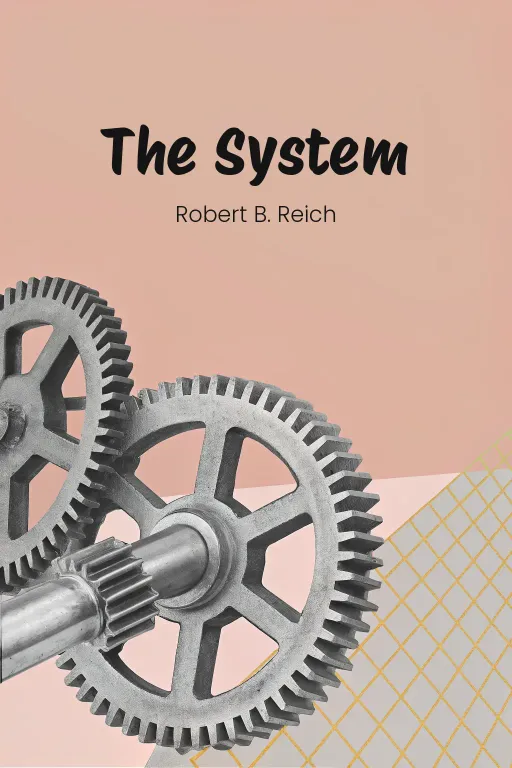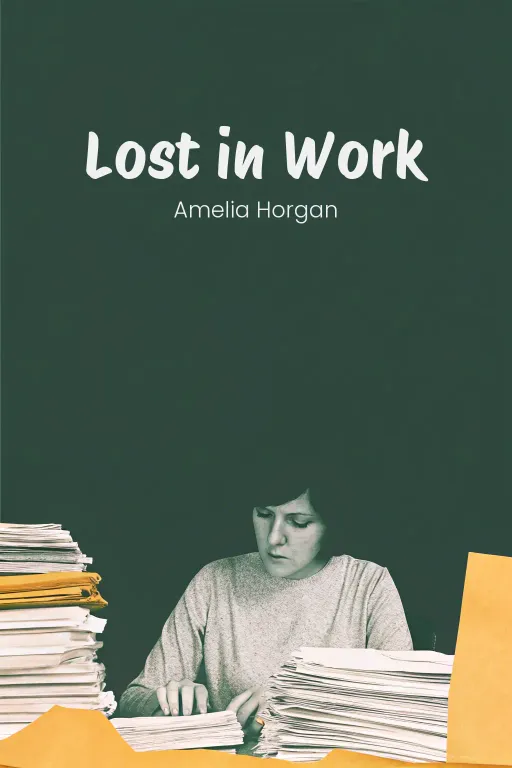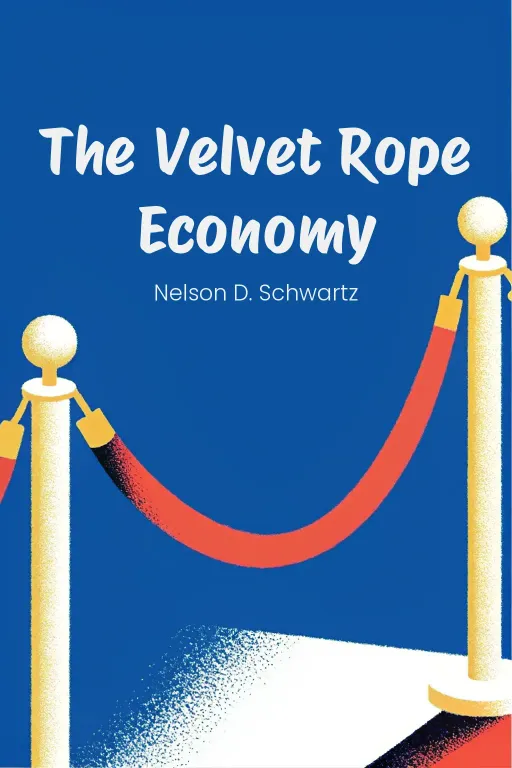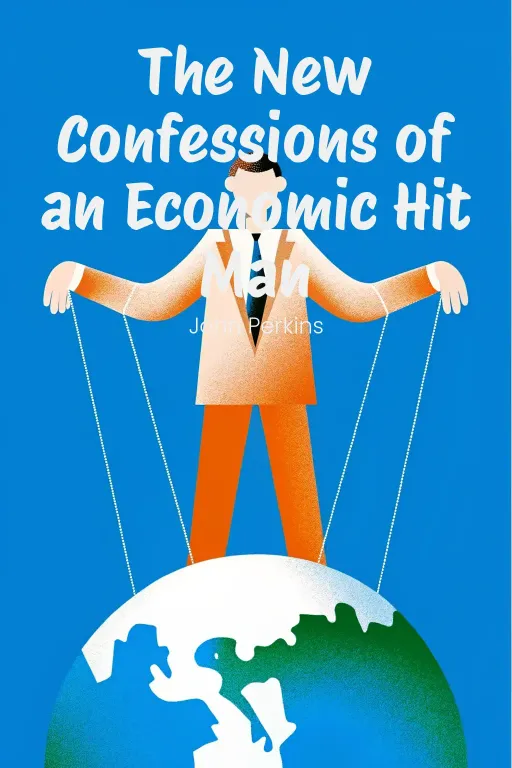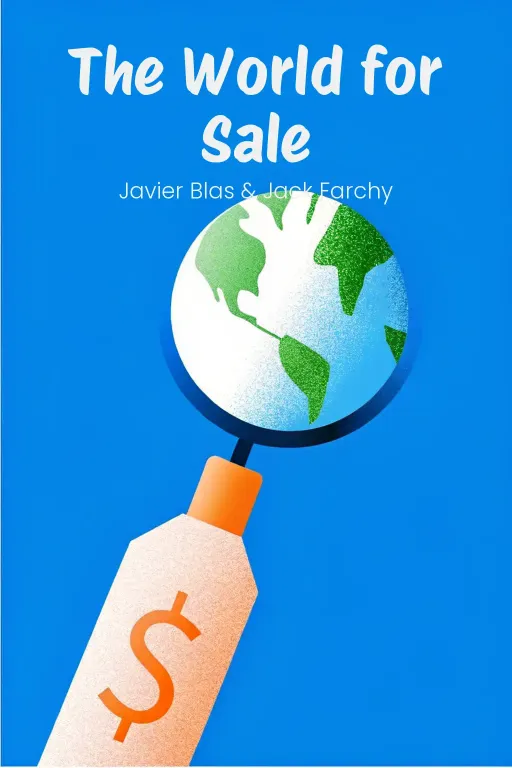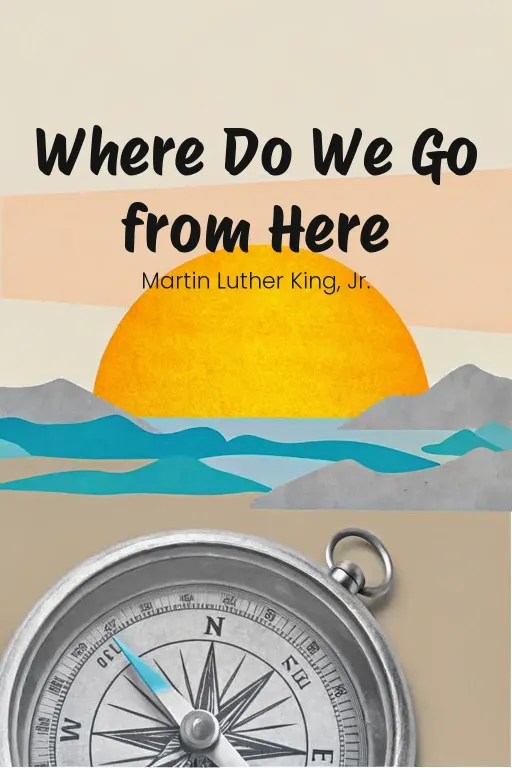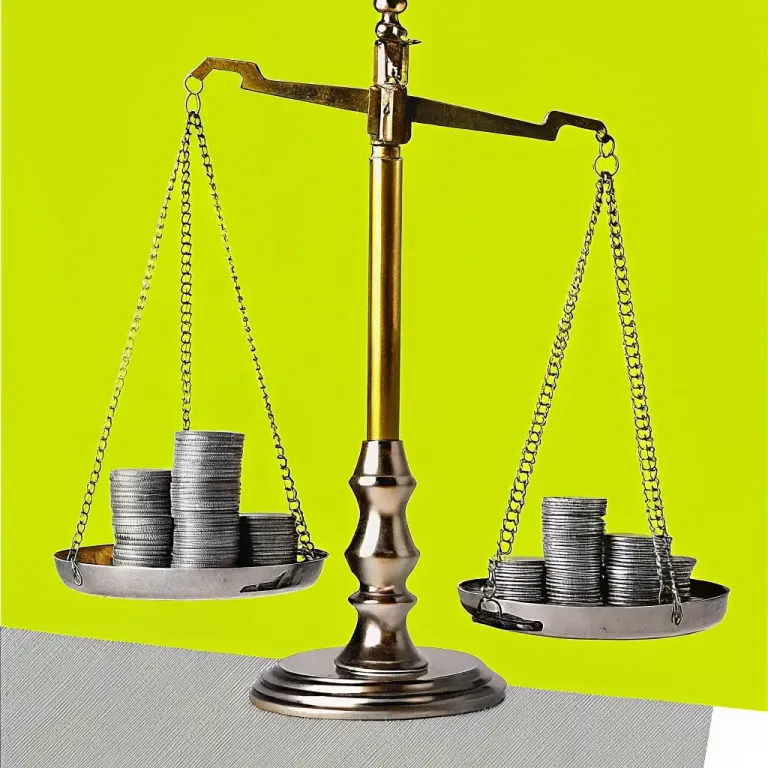
Game Over: Can We Hack the System?
Podcast by Civics Decoded with Thomas and Grace
Who Rigged It, How We Fixed It
Introduction
Part 1
Thomas: Hey everyone, welcome! Today we're tackling a big one, something that impacts all of us whether we see it or not. Ever wonder why the rich just keep getting richer, while the rest of us are, well, struggling? Grace: Yeah, or to put it bluntly, why are billionaires buying up yachts while the average family is stressing over grocery bills? It feels like no matter how we vote, the system never “really” changes, does it? Thomas: Exactly! That's the heart of Robert Reich's book, The System: Who Rigged It, How We Fix It. He “really” breaks down how America's democracy, in his view, has been hijacked and turned into an oligarchy. Power and wealth concentrated at the very top, with the rest of us fighting for scraps. Grace: And Reich doesn’t hold back, does he? He talks about this transition from "stakeholder capitalism"—where companies used to think about their employees, communities, the environment—to this "shareholder capitalism" thing, where all that matters is maximizing profit for CEOs and shareholders. Sounds about right, huh? Thomas: Sadly, it does. He dives into how this inequality is perpetuated – things like deregulation, all that lobbying, political maneuvering that just keeps tilting the playing field. But, good news, it’s not all doom and gloom! He ends the book with a plan, a roadmap to reclaim our democracy, level the playing field with grassroots movements, structural reform. Grace: So, what are we going to unpack today then? First, we're going to discuss how the ultra-rich manipulate the political system. And, spoiler alert, it's not just about campaign donations. Then, we’ll reveal how this shareholder-first mentality has changed corporate ethics, leaving employees, communities, and the environment in the dust. Thomas: And we'll finish on a positive note, talking about those growing grassroots movements that are pushing back for fair wages, environmental justice, and, yes, democracy. Grace: Think of today's episode as… a rigged game of chess? Like, the board's tilted, the rules keep changing. The big question is: can we still win?
The Shift from Democracy to Oligarchy
Part 2
Thomas: That's a perfect segue, Grace. So, let's dive into the historical roots of this shift – how America transitioned from a more balanced democracy to what some call an oligarchic system. Reich points out that traditionally, our political battles were framed as left versus right, you know, debates over the size of government or tax policy. But he argues something fundamentally changed, really starting around the mid-20th century. Grace: Right. And what I appreciate is that Reich doesn't just point to some shadowy conspiracy, you know? It wasn't some sudden, overnight scheme. It's more like a slow burn, isn't it? He kind of traces it back to the 1970s when this consolidation of wealth and power really started to accelerate. So, what exactly happened back then? Thomas: Well, a few key things shifted. We started seeing economic policies that favored deregulation and privatization – championed, of course, under the guise of efficiency and economic growth. But really, it gave corporations and the wealthy a much freer hand. At the same time, union power was systematically dismantled, which really cut the legs out from under the middle class. And here's the kicker: economists Saez and Zucman revealed that the wealthiest 0.1% now control 20% of the nation's productivity. That's as concentrated as wealth was during the Gilded Age! Grace: That's... staggering. I mean, aren't we supposed to be past the age of robber barons? But Reich makes it sound like modern oligarchs are just as, if not more, entrenched than the Rockefellers and Vanderbilts of old. What's really driving this shift, though? I mean, beyond deregulation, isn't there also kind of a cultural transformation that's happened among the financial elite? Thomas: Absolutely. Reich really digs into the rise of what we call "shareholder capitalism." You see, post-World War II, a lot of corporations were operating under a philosophy that took broader stakeholders into account – workers, customers, even the public good. But starting in the late 20th century, the focus shifted to maximizing shareholder returns. Suddenly, it wasn't about building communities or creating long-term stability – it was about pumping up stock prices, at all costs. Grace: So basically, instead of asking, "What's good for our workers, or the community?" CEOs started thinking, "How do I boost the quarterly earnings report so I can score a bigger bonus?" Is that the gist of it? Thomas: Exactly! And once that happened, it created this trickle-down hierarchy of exploitation. CEOs slashed wages, fought unionization, and moved jobs overseas, all in the name of maximizing profits. And guess who cheered them on? Wealthy shareholders who saw their investments skyrocket. It's a self-reinforcing loop where those at the very top just keep consolidating their advantages. Grace: Alright, but if corporate greed is the battering ram, campaign finance feels like the weak point in the castle wall. Tell me about that statistic from the 2016 election – the one about the top 0.01% funding nearly half of all campaign contributions. Thomas: It's pretty mind-blowing, isn't it? Reich explains that during that election cycle, just 25,000 individuals were responsible for 40% of all political donations in the country. To put it another way, a tiny fraction of America was basically bankrolling the entire democratic process. And it's not just the money itself – it's what that money buys. Access. Influence. Politicians are incentivized to cater to their wealthiest donors, prioritizing their agendas over the needs of, say, the single mom working two jobs to make ends meet. Grace: And that's the thing, it's perfectly legal. That's the part that gets me. There's no smoke-filled room here – it's all done in plain sight. Lobbyists and donors literally have a revolving door with Capitol Hill. You've got CEOs and bankers shaping the very laws that regulate them! Remember the 2008 financial crisis? There was an impulse to rein them in, but lobbying seemed to kill any meaningful reform. Thomas: Oh, absolutely. Wall Street spent over $1 billion lobbying Congress after the crash, ensuring the banks avoided stronger regulations. Meanwhile, millions of Americans lost their homes, their jobs, their retirement savings. It's one of the clearest examples of how wealth-driven lobbying distorts the system. If the average voter feels powerless, it's because, well, they kind of are. Princeton researchers even found that policy outcomes overwhelmingly reflect the interests of the wealthy and organized interest groups, over the preferences of the majority. Grace: So, we're talking about a system where the wealthiest hire the rule-makers, then they make the rules to benefit themselves. And isn't it funny – or tragic, depending on how you look at it – how this imbalance erodes faith in democracy overall? Reich touches on this idea that when working-class people feel disenfranchised, they just start to disengage entirely. Thomas: Yes, and that disengagement makes the problem even worse. It's a vicious cycle: the system feels rigged, so people stop participating. But when they disengage, it opens the door even wider for the elites to consolidate their power. Populist movements have risen, partly in response to this frustration, but Reich warns that not all of these movements are created equal. Some highlight valid inequalities, but others exploit this anger to push “really” regressive agendas. Grace: It's almost like a pressure valve, isn't it? People know something is wrong, but if you've got one side saying, "Coddle the billionaires!" and the other saying, "Tear the system down altogether!" – where's the space for thoughtful reform in all of that? Thomas: Exactly, and that's why Reich insists that pathways to systemic change have to be, well, substantive. Surface-level efforts just won't cut it anymore. He argues for dismantling the very structures that allow wealth to dominate politics, like overturning Citizens United, establishing public campaign financing, and creating real accountability for corporate lobbying. But he also acknowledges grassroots movements play a critical role. That's where we've seen some sparks of hope. Grace: Sparks, sure. But do those sparks eventually turn into flames? I mean, if discontent is the fuel, we certainly have plenty of “that”. The question is, can these movements scale before the cycle just resets itself again?
Corporate Power and Shareholder Capitalism
Part 3
Thomas: So, this systemic erosion of democratic principles really sets the stage for understanding how corporate and political elites keep inequality going. One of the biggest things Reich talks about is shareholder capitalism, where making shareholders rich became the top priority for companies. We need to dig into how this idea took hold, the economic mess it caused, and the societal problems we're dealing with now. Grace: Absolutely, there’s a lot to unpack. You know, what gets me is how something so abstract—shareholder capitalism—can have such a huge impact on people’s everyday lives. Thomas, where did this all start? Thomas: Well, it starts with some heavy hitters like Milton Friedman. Back in the 70s, Friedman argued that the only social responsibility corporations had was to make money for their shareholders. Forget about employees, the local community, or even the environment—those weren’t supposed to be the corporation’s problem. CEOs and executives just ate this up. Then, in the 80s, Michael Jensen doubled down, saying companies should focus on shareholder returns, even if it meant hostile takeovers or firing a bunch of people. The thinking was, "If it makes more money, it’s okay." Grace: So, basically, Friedman and Jensen gave academic cover for a profit-at-all-costs mentality, right? Their ideas totally flipped the corporate mission, from "How do we serve everyone involved?" to "How do we make the investors rich?" Thomas: Exactly. And the effects were huge. Employees stopped being seen as partners in a company’s success and started being seen as costs to cut. Executives started focusing on boosting stock prices through financial tricks—stock buybacks, cutting wages, outsourcing jobs—all at the expense of long-term stability. Grace: Hold on, I want to jump in here because I know some listeners are thinking, "Stock buybacks? Why should I care?" It might sound complicated, but Reich explains it really well. Essentially, companies use their profits to buy back their own stock, which reduces the number of shares on the market. Fewer shares mean higher stock prices, which is great news if you own stock. And who owns most of the stock? The rich, right? It's a classic way to move wealth upwards. Thomas: Right, and what's even more frustrating is how workers often get screwed in the process. Look at Jamie Dimon, the CEO of JPMorgan Chase, who made $31 million in 2018. Meanwhile, a lot of JPMorgan employees were barely scraping by, even relying on food stamps. This isn't just a one-off thing; it shows a system where CEOs earn 300 times more than their average workers. Grace: It’s crazy how this thinking goes way beyond just boardrooms and affects people's daily lives. I mean, if you are working two jobs just to pay rent, while your company is throwing billions into stock buybacks, you’re not just underpaid—you’re basically helping pay for your boss’s luxury. Thomas: Exactly. And Reich connects this directly to the decline in protections for workers. Back in the mid-20th century, strong unions acted as a check on corporate greed. Unionized workers had power—not just to negotiate better pay but to push back on short-term, profit-focused decisions. Back then, over 30% of private-sector workers were in a union. Now? It's just 6.4%. Grace: Wow, that’s a huge drop. And this didn’t just “happen”, right? These unions were systematically weakened. Anti-union laws, lobbying to limit organizing, court decisions that made it harder for workers to strike—it wasn't an accident. Thomas: Not at all. Corporate interests worked with lawmakers to rig the game. And when unions lost power, workers lost bargaining power. Now, so many employees are stuck with stagnant wages and minimal benefits, without the ability to demand better. Grace: Which brings us to deregulation. This is another key part of the shareholder capitalism story that Reich explores. If you look at the 80s, for example—it wasn't just about weakening unions; it was also about getting rid of regulations that kept corporations in check. Suddenly, companies could consolidate markets and create near-monopolies. Thomas: Exactly. Deregulation didn’t just reduce oversight—it allowed corporations to become these huge entities that control entire industries. Companies like Amazon and Google are perfect examples. They dominate markets, dictate working conditions, and stifle competition. And because they're so massive, even the government struggles to hold them accountable. Grace: You know, I spent years covering financial markets, and one thing that always amazed me was how these monopolies create a "winner-takes-all" situation that screws over workers. Amazon warehouses, for instance, employ tons of people under really tough conditions, but good luck trying to unionize there. Thomas: Exactly. And from Reich’s perspective, all these trends—the decline of unions, deregulation, and consolidation of power—they all feed back into this system of shareholder capitalism. Workers lose job security and bargaining power, while these corporations put profits above everything else. The result? A society that caters to the wealthy while everyone else struggles. Grace: Which brings us to the social fallout. Reich doesn’t hold back here. He's clear that shareholder capitalism doesn't just create inequality—it destroys communities. Take the 2008 financial crisis, for example. Corporations like JPMorgan Chase got taxpayer-funded bailouts, bounced back quickly, and started making record profits. Meanwhile, normal Americans lost homes, savings, even entire neighborhoods. It's what Reich calls “socialism for the rich” and “harsh capitalism for the rest." Thomas: That's one of the starkest contradictions, isn't it? When things go wrong, corporations get bailed out by the government. When individuals suffer, they’re told to fend for themselves. And that double standard “really” damages communities. Factories close. Jobs move overseas. And people are stuck in low-paying jobs with no way to move up. Grace: It definitely erodes faith in the system. And what’s worse, the longer it goes on, the harder it is to fix. Economic inequality leads to social division, political polarization, and a general sense of "What’s the point?" when it comes to trying to make things better. Thomas: That’s why Reich’s call for a stakeholder model of capitalism is so important. He argues that businesses need to look beyond shareholder profits and consider workers, communities, and the environment as equally important stakeholders. It’s about creating an economy that values people over profits—a system that, dare I say, works for everyone.
Grassroots Movements and Systemic Reform
Part 4
Thomas: Corporate dominance has consequences that stretch way beyond economics, right? It eats away at social safety nets and protections for workers. But Reich gives us a little hope, reminding us that grassroots movements – you know, those collective efforts that bubble up from everyday frustrations and dreams – they’ve historically reshaped systems that seemed totally unchangeable. So, today we're shining a light on these grassroots movements and how they lead to systemic reform, starting way back when, jumping to today's activism, and then wrapping it all up with some tools and strategies to make it all work. Grace: Okay, so we’re doing a little historical review before diving into the current battles. Sounds good. Tell me about some of these grassroots heroes. Who’s up first? Thomas: Let’s kick it off with a classic: the Flint Sit-Down Strike in '36 and '37. Picture this: peak Great Depression in Flint, Michigan, and thousands of GM workers were just fed up, right? Low wages, unsafe conditions, being treated like they were disposable. But instead of just walking out – a traditional strike – they went bold. They stayed in. Workers occupied the factories, completely halting production. Super risky, super audacious, and it put them right up against one of the most powerful industries at the time. Grace: Yeah, I can imagine that didn't exactly thrill the folks running General Motors, or the police, for that matter. Thomas: No, not at all. There were clashes with the police and security and the threat of violence was there all the time during the strike. But, these workers had something on their side: solidarity. They organized food deliveries, medical aid, and they kept the communication flowing to stay united while under a ton of pressure. And it paid off! After 44 days or so, GM caved and recognized the United Auto Workers union. It wasn’t just some win for Flint; it was a turning point for labor organizing across the country, which then paved the way for key protections like fair wages and the eight-hour workday. Grace: Wait a second, so this wasn’t just about cars and assembly lines? Thomas: Oh, no way. It was about power. Specifically, the power imbalance between workers and those big corporations. By sticking together, these workers showed that collective action could actually push back against these Goliaths. And that message spread, right? Other workers in textiles, steel, and retail started using the same methods to demand better conditions. It was like a chain reaction, showing how grassroots action can “really” lead to systemic change. Grace: And not just a one-hit wonder, either. Fast forward a couple of decades, and you've got the Civil Rights Movement, another grassroots powerhouse that reshaped the nation. What's striking about examples like the Montgomery Bus Boycott is just how much strategy and endurance these movements needed. Rosa Parks refusing to give up her seat wasn't just a random act of defiance. It was actually part of a larger, coordinated plan. Thomas: Exactly. After Parks was arrested in '55, Black citizens in Montgomery organized a year-long boycott of the city's bus system, and they refused to use public transportation until segregation laws were gone. It wasn't easy. Many people walked miles to work every day or organized carpools. There were arrests, harassment, and economic retaliation against the boycott leaders, but the movement stayed strong, and eventually, the U.S. Supreme Court ruled to desegregate Montgomery's buses. That victory was moral, sure, but it was also legal and structural. It proved that grassroots action could take down deeply rooted injustice. Grace: I guess my cynical side back then would want to ask, "Okay, you’ve won this one battle, but can you keep this going long enough to win the war?" We know they did, but it took a Herculean effort. Thomas: Right, and history tells us that resilience and community are key. You don't just fight one fight, you keep on evolving to meet new challenges. And that brings us to today, where movements like Black Lives Matter show how this legacy of grassroots action continues, but now with digital tools to amplify their reach. Grace: Social media's a double-edged sword, though, isn't it? I mean, you get these huge, decentralized movements like BLM, which, as Reich says, mobilized millions in 2020 alone. But on the other hand, it feels like attention spans are shorter than ever. Does modern activism risk becoming kind of performative rather than actually effective? Thomas: I get that. But BLM has shown it can actually drive real change. Think back to the summer of 2020, after George Floyd’s murder. The protests led cities to rethink police budgets, and some pledged to put funds into social services. Corporations – probably feeling the heat – made public promises to fix racial inequalities within their own companies. The conversation on systemic racism, it reached a scale we hadn’t seen in decades. So, no, it's not just hashtags; they're planting seeds for change, even if it takes a while. Grace: Okay, fair enough. And while we're on the topic of slow-burning change, let’s talk about two modern policy ambitions: Medicare for All and the Green New Deal. These ideas feel almost utopian, they're so ambitious. But Reich sees them as the next logical step for grassroots movements. What makes them so different? Thomas: Well, they’re bold because they tackle the root causes of inequality, not just the surface issues. Medicare for All addresses America’s broken healthcare system by proposing universal coverage, and that eliminates the profit-driven private insurance model. And the Green New Deal goes even further; it combines climate action with economic justice by pushing for renewable energy jobs and protecting communities that are most affected by climate disasters. Grace: Yeah, and I guess neither of those came out of someone's policy binder fully formed. They were built through activism, right? Thomas: 100%. Both campaigns grew from grassroots energy, especially among younger people who see how these issues connect – how climate justice links to racial and economic justice, or how lack of healthcare makes poverty worse. And these movements “really” rely on building coalitions, from local organizing to town hall advocacy, and even online campaigns designed to pressure lawmakers into action. Grace: So we’re back to that idea of solidarity being the special sauce. But online organizing can only do so much. What about Reich's emphasis on those old-school tactics, like direct action and strikes? Are they still relevant? Thomas: Absolutely! Just look at the recent strikes by Amazon and Starbucks workers. They are textbook examples of how direct action can disrupt things to demand better pay and conditions. And it's “really” cool how these workers use both traditional organizing and modern digital fundraising to keep their efforts going. Crowdsourcing campaigns allow them to skip those big-money donors, which gives them more independence. Grace: Crowdsourcing kind of feels like a democratization of resources – like the grassroots version of venture capital. So, Thomas, if someone’s listening and they’re like, "Okay, this is inspiring, but how do we actually do this?" What's the roadmap here? Thomas: Reich lays it out pretty clearly. First, take down the barriers that let wealth dominate politics: overturn Citizens United, make lobbying rules strict, and do public campaign financing. Second, build up grassroots momentum, get citizens involved at every level – local campaigns, unionizing, and direct advocacy. Third, make corporations accountable (not just to shareholders) by linking corporate governance to community impact. It's a mix of legislative reform and grassroots action. Grace: That's a long to-do list, but at least it's doable. And let's be real – none of this happens quickly. If the Flint Sit-Down Strike and the Montgomery Bus Boycott taught us anything, it’s that systemic change needs grit, planning, and, well, a whole lot of patience.
Conclusion
Part 5
Thomas: Okay, so to wrap up our discussion today, we've really delved into how Robert Reich highlights this shift from a true democracy towards something resembling an oligarchy, largely driven by the incredible concentration of wealth and its subsequent impact on our political system. We talked about how shareholder capitalism has skewed corporate priorities, focusing almost exclusively on profits, often at the expense of both workers and the communities they live in. And then there’s this combination of deregulation and the decline of unions, which has only made this imbalance even worse. But, you know, it's not all doom and gloom. We also touched on how grassroots movements, both historically and today, are pushing back against this system, showing that collective action can still be an incredibly powerful force for change. Grace: Right, and if there's one key point Reich's work “really” drives home, it's that these issues, as daunting as they seem, aren't impossible to overcome. Whether we're talking about breaking free from this cycle of corporate greed, reforming our democracy so it actually works for the majority instead of just a select few, or even building real support for ambitious policy ideas like the Green New Deal, the path forward is there. It's “really” just a question of whether we're willing to roll up our sleeves and actually do the work. Thomas: Exactly! And Reich gives us this “really” important reminder: while systemic change can seem overwhelming, history shows us that it is possible when people unite with a common goal. Whether it's the auto workers striking in Flint back in the day or the marchers in Montgomery during the Civil Rights Movement, these moments in history teach us that no matter how deeply rooted a system might appear, it can still be dismantled and rebuilt into something better. Grace: So, let’s leave our listeners with this thought. The system didn't just magically become rigged. It was intentionally constructed this way, through specific decisions and policies. And if something was built, it can be rebuilt, right? The real question is, are we, as a society, ready to get started?
